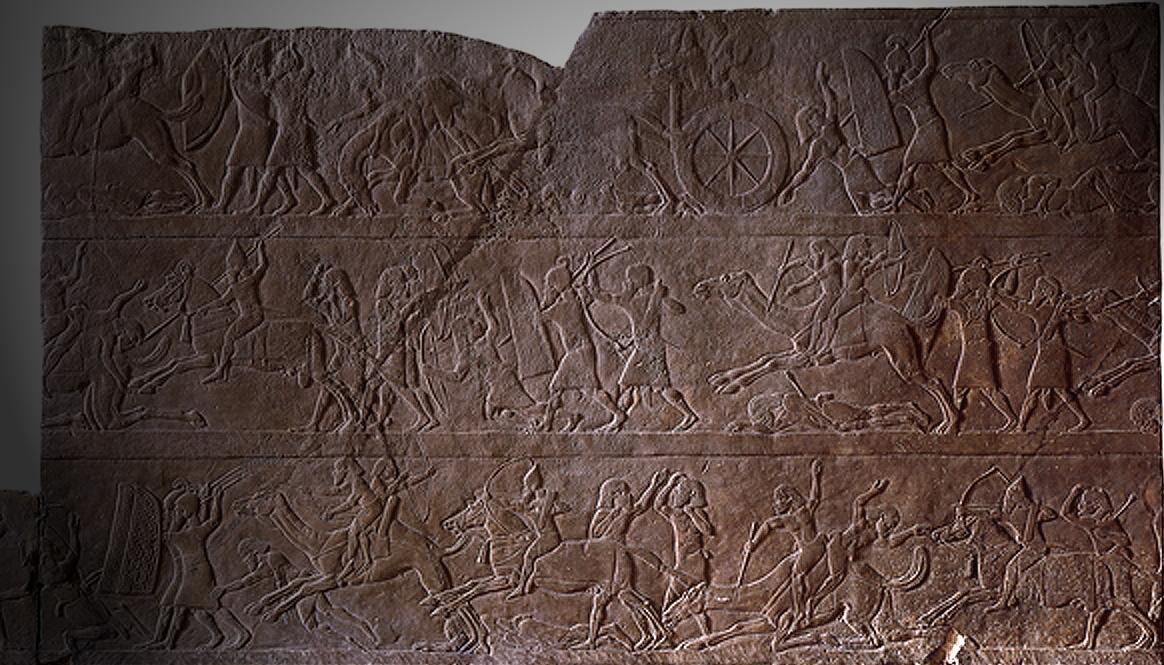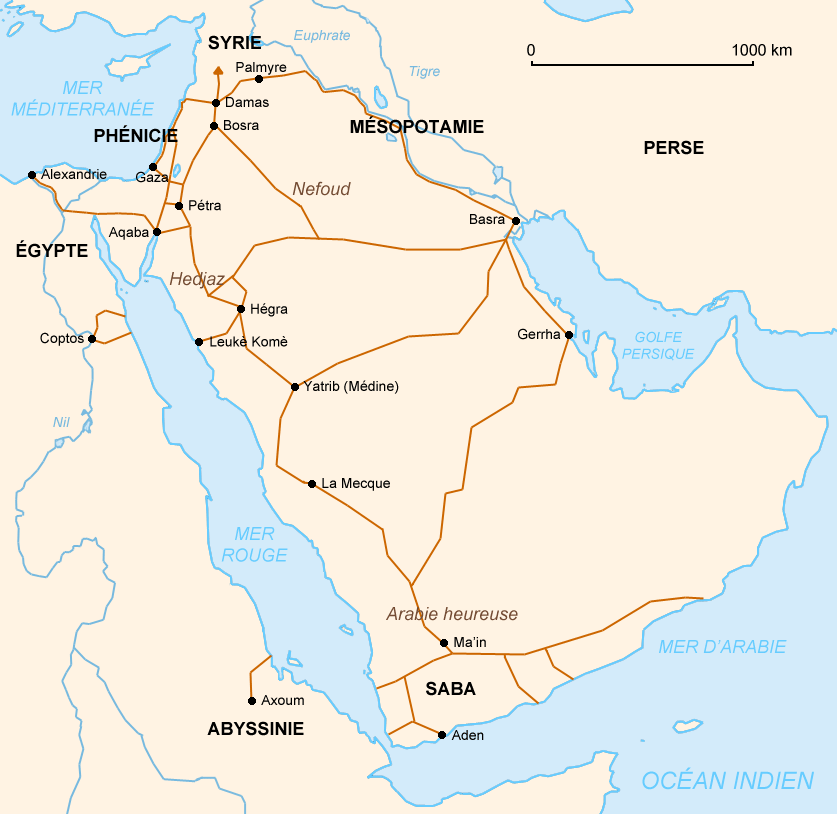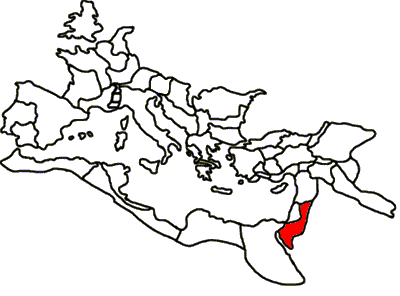|
Ishmaelites
The Ishmaelites ( he, ''Yīšməʿēʾlīm,'' ar, بَنِي إِسْمَاعِيل ''Bani Isma'il''; "sons of Ishmael") were a collection of various Arabian tribes, confederations and small kingdoms described in Islamic tradition as being descended from and named after Ishmael, a prophet according to the Quran, the first son of Abraham and the Egyptian Hagar. According to the Book of Genesis in the Hebrew Bible, Ishmael had one daughter and twelve sons, the "twelve princes" mentioned in Genesis 17:20. In Islamic tradition, this gave rise to the "Twelve Tribes of Ishmael", Arab tribes from which the early Muslims were descended. In Jewish tradition, the Twelve Tribes of Israel were descended from Abraham's other son, Isaac, via Isaac's son Jacob. These traditions are accepted by both Islam and Judaism. Genesis and 1 Chronicles describe the Qedarites as a tribe descended from the second son of Ishmael, Qedar. Some Abrahamic scholars described the historic tribe of Nabataeans a ... [...More Info...] [...Related Items...] OR: [Wikipedia] [Google] [Baidu] |
Ishmael
Ishmael ''Ismaḗl''; Classical/Qur'anic Arabic: إِسْمَٰعِيْل; Modern Standard Arabic: إِسْمَاعِيْل ''ʾIsmāʿīl''; la, Ismael was the first son of Abraham, the common patriarch of the Abrahamic religions; and is considered as a prophet in Islam. His mother was the Egyptian Hagar (). According to the Genesis account, he died at the age of 137 (). Jewish, Christian and Islamic traditions consider Ishmael to be the ancestor of the Ishmaelites ( Hagarenes or Arabians) and patriarch of Qaydār. According to Muslim tradition, in which he is regarded as an ancestor of Muhammad,''A–Z of Prophets in Islam and Judaism'', Wheeler, ''Ishmael'' Ishmael thereby founded a great nation as promised by God in the Old Testament, and was buried with his mother Hagar ( Hājar) next to the Kaaba in Mecca, under the area demarcated by the semi-circular Hijr Ismail wall. Etymology The name "Yishma'el" existed in various ancient Semitic cultures, including early Baby ... [...More Info...] [...Related Items...] OR: [Wikipedia] [Google] [Baidu] |
Arab
The Arabs (singular: Arab; singular ar, عَرَبِيٌّ, DIN 31635: , , plural ar, عَرَب, DIN 31635: , Arabic pronunciation: ), also known as the Arab people, are an ethnic group mainly inhabiting the Arab world in Western Asia, North Africa, the Horn of Africa, and the western Indian Ocean islands (including the Comoros). An Arab diaspora is also present around the world in significant numbers, most notably in the Americas, Western Europe, Turkey, Indonesia, and Iran. In modern usage, the term "Arab" tends to refer to those who both carry that ethnic identity and speak Arabic as their native language. This contrasts with the narrower traditional definition, which refers to the descendants of the tribes of Arabia. The religion of Islam was developed in Arabia, and Classical Arabic serves as the language of Islamic literature. 93 percent of Arabs are Muslims (the remainder consisted mostly of Arab Christians), while Arab Muslims are only 20 percent of the ... [...More Info...] [...Related Items...] OR: [Wikipedia] [Google] [Baidu] |
Qedarites
The Qedarites ( ar, قيدار, Qaydār) were a largely nomadic ancient Arab tribal confederation centred in the Wādī Sirḥān in the Syrian Desert. Attested from the 8th century BC, the Qedarites formed a powerful polity which expanded its territory over the course of the 8th to 5th centuries BC to cover a large area in northern Arabia stretching from the western borders of Babylonia to the eastern borders of Egypt.Stearns and Langer, 2001, p. 41. The Qedarites played an important role in the history of the Levant and of North Arabia, where they enjoyed close relations with the nearby Canaanite and Aramaean states, and became important participants in the trade of spices and aromatics imported into the Fertile Crescent and the Mediterranean world from South Arabia. Having engaged in both friendly ties and hostilities with the Mesopotamian powers such as the Neo-Assyrian and Neo-Babylonian empires, the Qedarites eventually became integrated within the structure of the Pe ... [...More Info...] [...Related Items...] OR: [Wikipedia] [Google] [Baidu] |
Qedar
The Qedarites ( ar, قيدار, Qaydār) were a largely nomadic ancient Arab tribal confederation centred in the Wādī Sirḥān in the Syrian Desert. Attested from the 8th century BC, the Qedarites formed a powerful polity which expanded its territory over the course of the 8th to 5th centuries BC to cover a large area in northern Arabia stretching from the western borders of Babylonia to the eastern borders of Egypt.Stearns and Langer, 2001, p. 41. The Qedarites played an important role in the history of the Levant and of North Arabia, where they enjoyed close relations with the nearby Canaanite and Aramaean states, and became important participants in the trade of spices and aromatics imported into the Fertile Crescent and the Mediterranean world from South Arabia. Having engaged in both friendly ties and hostilities with the Mesopotamian powers such as the Neo-Assyrian and Neo-Babylonian empires, the Qedarites eventually became integrated within the structure of the Pe ... [...More Info...] [...Related Items...] OR: [Wikipedia] [Google] [Baidu] |
Qedarites Map
The Qedarites ( ar, قيدار, Qaydār) were a largely nomadic ancient Arab tribal confederation centred in the Wādī Sirḥān in the Syrian Desert. Attested from the 8th century BC, the Qedarites formed a powerful polity which expanded its territory over the course of the 8th to 5th centuries BC to cover a large area in northern Arabia stretching from the western borders of Babylonia to the eastern borders of Egypt.Stearns and Langer, 2001, p. 41. The Qedarites played an important role in the history of the Levant and of North Arabia, where they enjoyed close relations with the nearby Canaanite and Aramaean states, and became important participants in the trade of spices and aromatics imported into the Fertile Crescent and the Mediterranean world from South Arabia. Having engaged in both friendly ties and hostilities with the Mesopotamian powers such as the Neo-Assyrian and Neo-Babylonian empires, the Qedarites eventually became integrated within the structure of the Pe ... [...More Info...] [...Related Items...] OR: [Wikipedia] [Google] [Baidu] |
Nabataeans
The Nabataeans or Nabateans (; Nabataean Aramaic: , , vocalized as ; Arabic: , , singular , ; compare grc, Ναβαταῖος, translit=Nabataîos; la, Nabataeus) were an ancient Arab people who inhabited northern Arabia and the southern Levant. Their settlements—most prominently the assumed capital city of Raqmu (present-day Petra, Jordan)—gave the name ''Nabatene'' ( grc, Ναβατηνή, translit=Nabatēnḗ) to the Arabian borderland that stretched from the Euphrates to the Red Sea. The Nabateans emerged as a distinct civilization and political entity between the 4th and 2nd centuries BCE,Taylor, Jane (2001). ''Petra and the Lost Kingdom of the Nabataeans''. London: I.B.Tauris. pp. 14, 17, 30, 31. . Retrieved 8 July 2016. with their kingdom centered around a loosely controlled trading network that brought considerable wealth and influence across the ancient world. Described as fiercely independent by contemporary Greco-Roman accounts, the Nabataeans were ann ... [...More Info...] [...Related Items...] OR: [Wikipedia] [Google] [Baidu] |
Hagar
Hagar, of uncertain origin; ar, هَاجَر, Hājar; grc, Ἁγάρ, Hagár; la, Agar is a biblical woman. According to the Book of Genesis, she was an Egyptian slave, a handmaiden of Sarah (then known as ''Sarai''), whom Sarah gave to her own husband Abram (later renamed Abraham) as a wife to bear him a child. Abraham's firstborn son, through Hagar, Ishmael, became the progenitor of the Ishmaelites, generally taken to be the Arabs. Various commentators have connected her to the Hagrites (sons of Agar), perhaps claiming her as their eponymous ancestor. Hagar is alluded to, although not named, in the Quran, and Islam considers her Abraham's second wife. Life Abraham and Hagar According to the Bible, Hagar was the Egyptian slave of Sarai, Abram's wife (whose names later became Sarah and Abraham). Sarai had been barren for a long time and sought a way to fulfill God's promise that Abram would be father of many nations, especially since they had grown old, so she off ... [...More Info...] [...Related Items...] OR: [Wikipedia] [Google] [Baidu] |
Book Of Genesis
The Book of Genesis (from Greek ; Hebrew: בְּרֵאשִׁית ''Bəreʾšīt'', "In hebeginning") is the first book of the Hebrew Bible and the Christian Old Testament. Its Hebrew name is the same as its first word, ( "In the beginning"). Genesis is an account of the creation of the world, the early history of humanity, and of Israel's ancestors and the origins of the Jewish people. Tradition credits Moses as the author of Genesis, as well as the books of Exodus, Leviticus, Numbers and most of Deuteronomy; however, modern scholars, especially from the 19th century onward, place the books' authorship in the 6th and 5th centuries BC, hundreds of years after Moses is supposed to have lived.Davies (1998), p. 37 Based on scientific interpretation of archaeological, genetic, and linguistic evidence, most scholars consider Genesis to be primarily mythological rather than historical. It is divisible into two parts, the primeval history (chapters 1–11) and the anc ... [...More Info...] [...Related Items...] OR: [Wikipedia] [Google] [Baidu] |
Abraham
Abraham, ; ar, , , name=, group= (originally Abram) is the common Hebrew patriarch of the Abrahamic religions, including Judaism, Christianity, and Islam. In Judaism, he is the founding father of the special relationship between the Jews and God; in Christianity, he is the spiritual progenitor of all believers, whether Jewish or non-Jewish; and in Islam, he is a link in the chain of Islamic prophets that begins with Adam (see Adam in Islam) and culminates in Muhammad. His life, told in the narrative of the Book of Genesis, revolves around the themes of posterity and land. Abraham is called by God to leave the house of his father Terah and settle in the land of Canaan, which God now promises to Abraham and his progeny. This promise is subsequently inherited by Isaac, Abraham's son by his wife Sarah, while Isaac's half-brother Ishmael is also promised that he will be the founder of a great nation. Abraham purchases a tomb (the Cave of the Patriarchs) at Hebro ... [...More Info...] [...Related Items...] OR: [Wikipedia] [Google] [Baidu] |
Nebaioth
Nebaioth ( ''Nəḇāyōṯ'') or Nebajoth is mentioned at least five times in the Hebrew Bible, according to which he was the firstborn son of Ishmael, and the name appears as the name of one of the wilderness tribes mentioned in the Book of Genesis 25:13, and in the Book of Isaiah 60:7. Biblical occurrences In the Book of Genesis, Nebaioth is listed as the firstborn son of Ishmael: :...Now these are the generations of Ishmael, Abraham's son, whom Hagar the Egyptian, Sarah's handmaid, bore unto Abraham. And these are the names of the sons of Ishmael, by their names, according to their generations: the first-born of Ishmael, Nebaioth; and Kedar, and Adbeel, and Mibsam, and Mishma, and Dumah, and Massa; Hadad, and Tema, Jetur, Naphish, and Kedem; these are the sons of Ishmael, and these are their names, by their villages, and by their encampments; twelve princes according to their nations... (Book of Genesis 25:12-16) Nebaioth is portrayed as the brother of Mahalath, one of Es ... [...More Info...] [...Related Items...] OR: [Wikipedia] [Google] [Baidu] |
Heir
Inheritance is the practice of receiving private property, titles, debts, entitlements, privileges, rights, and obligations upon the death of an individual. The rules of inheritance differ among societies and have changed over time. Officially bequeathing private property and/or debts can be performed by a testator via will, as attested by a notary or by other lawful means. Terminology In law, an ''heir'' is a person who is entitled to receive a share of the deceased's (the person who died) property, subject to the rules of inheritance in the jurisdiction of which the deceased was a citizen or where the deceased (decedent) died or owned property at the time of death. The inheritance may be either under the terms of a will or by intestate laws if the deceased had no will. However, the will must comply with the laws of the jurisdiction at the time it was created or it will be declared invalid (for example, some states do not recognise handwritten wills as valid, or ... [...More Info...] [...Related Items...] OR: [Wikipedia] [Google] [Baidu] |







.jpg)
